Logic vs. Logical — What's the Difference?
By Urooj Arif & Fiza Rafique — Updated on February 27, 2024
Logic refers to the science of reasoning, deduction, and inference, focusing on the principles of valid thinking. Logical, an adjective, describes anything consistent with or based on logic, emphasizing coherence and sound reasoning.

Difference Between Logic and Logical
Table of Contents
ADVERTISEMENT
Key Differences
Logic is the systematic study of the principles of valid inference and correct reasoning. It encompasses various methods and principles used to distinguish good from bad arguments. Logical, on the other hand, pertains to being in accordance with the principles of logic. It's used to describe actions, thoughts, or statements that are reasoned well and make sense within a logical framework.
Logic as a noun provides the foundation for constructing and analyzing arguments, the adjective logical describes the quality or state of something that adheres to this foundation. For example, a logical argument is one that follows the rules of logic laid down by the study of logic.
Logic includes different types like formal logic, which deals with forms of reasoning, and informal logic, focusing on content and context. Logical can be applied broadly across contexts, indicating anything that follows a coherent pattern of reasoning, regardless of the specific type of logic it employs.
Logic sets the standards for reasoning, offering tools and methodologies for examining arguments, while being logical is the practice of applying these standards and tools in actual reasoning processes. It’s the difference between knowing the theory (logic) and putting the theory into practice (logical).
Comparison Chart
Nature
Noun: a field of study
Adjective: describing a characteristic
ADVERTISEMENT
Focus
Principles and structure of reasoning
Consistency with logic
Application
Theoretical: frameworks for reasoning
Practical: application of reasoning
Types/Forms
Formal logic, informal logic, symbolic logic, etc.
Logical thinking, logical fallacies, etc.
Examples
Studying logic to understand argument structures
Making a logical decision based on evidence
Compare with Definitions
Logic
The quality of being justifiable by reason.
The logic of her argument was undeniable.
Logical
Of or relating to logic.
Logical symbols are used to represent logical expressions.
Logic
The study of reasoning principles.
Logic is essential for developing critical thinking skills.
Logical
Demonstrating linear and coherent thought processes.
Her explanation was logical and easy to follow.
Logic
A system or set of principles underlying the arrangements of elements in a computer or electronic device to perform a task.
The logic behind software programming is complex.
Logical
Pertaining to or characterized by clear, sound reasoning.
His conclusion was logical, based on the evidence presented.
Logic
The relationship between elements and the principles governing their arrangement.
The logic of the database schema ensures data consistency.
Logical
Expected or sensible under the circumstances.
The logical outcome of the debate was a compromise.
Logic
A particular mode of reasoning viewed as valid or faulty.
The detective followed a flawed logic in solving the case.
Logical
Following or showing a reasonable or necessary consequence of a specified action.
It is logical to prepare for the exam to achieve a good score.
Logic
Logic (from Greek: λογική, logikḗ, 'possessed of reason, intellectual, dialectical, argumentative') is the systematic study of valid rules of inference, i.e. the relations that lead to the acceptance of one proposition (the conclusion) on the basis of a set of other propositions (premises).
Logical
Of, relating to, in accordance with, or of the nature of logic
Logical disputation.
Logic
The study of principles of reasoning, especially of the structure of propositions as distinguished from their content, and of method and validity in deductive reasoning.
Logical
Based on earlier or otherwise known statements, events, or conditions; reasonable
Rain was a logical expectation, given the time of year.
Logic
A mode of reasoning
By that logic, we should sell the company tomorrow.
Logical
Reasoning or capable of reasoning in a clear and consistent manner
A very logical person.
Logic
A formal or informal language together with a deductive system or a model-theoretic semantics.
Logical
Reasonable.
Logic
The path of reasoning used in any specific argument; as, his logic was irrefutable.
Logical
Of or pertaining to logic; used in logic; as, logical subtilties.
Logic
Reasoned and reasonable judgment;
It made a certain kind of logic
Logic
A system of reasoning
Common Curiosities
Is logic always concerned with truth?
Logic focuses on the structure of arguments and their validity, not necessarily the truth of the premises.
What is logic?
Logic is the study of the principles of correct reasoning and argumentation.
What is a logical fallacy?
A logical fallacy is an error in reasoning that renders an argument invalid.
Can something be logical but not practical?
Yes, an idea can be logical in theory but impractical due to real-world constraints.
How is logical reasoning tested?
Logical reasoning is often tested through puzzles, problems, or scenarios that require applying logical principles to solve.
What does logical mean?
Logical describes something that is based on the principles of logic or reasoned well.
Can an argument be logical but not based on true premises?
Yes, an argument can be logical (valid in form) but based on false premises, leading to an unsound conclusion.
Is being logical the same as being right?
Being logical means reasoning correctly, but it doesn’t necessarily mean that one’s conclusion is right if based on incorrect information.
How does logic differ from being logical?
Logic is a theoretical framework or system, whereas being logical refers to applying this framework in thinking or reasoning.
What is formal logic?
Formal logic is the study of inference with purely formal content, where no interpretation is given to the symbols or terms.
What is the importance of logic in everyday life?
Logic is crucial for critical thinking, problem-solving, and making informed decisions in everyday life.
What is an example of logical thinking?
Evaluating evidence before reaching a conclusion is an example of logical thinking.
What makes a decision logical?
A decision is logical if it is made based on sound reasoning and evidence.
Can logic be applied to emotions?
While emotions are not logical in themselves, understanding and managing them can involve logical thinking.
How does logic relate to mathematics?
Logic forms the foundation of mathematical reasoning, providing the rules and structures that underpin mathematical proofs and concepts.
Share Your Discovery

Previous Comparison
Guard vs. Guide
Next Comparison
Board vs. PlankAuthor Spotlight
Written by
Urooj ArifUrooj is a skilled content writer at Ask Difference, known for her exceptional ability to simplify complex topics into engaging and informative content. With a passion for research and a flair for clear, concise writing, she consistently delivers articles that resonate with our diverse audience.
Co-written by
Fiza RafiqueFiza Rafique is a skilled content writer at AskDifference.com, where she meticulously refines and enhances written pieces. Drawing from her vast editorial expertise, Fiza ensures clarity, accuracy, and precision in every article. Passionate about language, she continually seeks to elevate the quality of content for readers worldwide.
















































